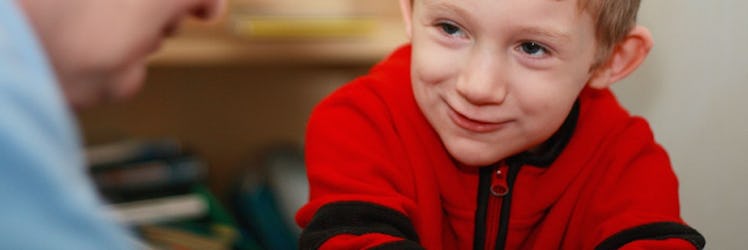The Simple Realization That Helped Me Move Beyond My Son’s Autism Diagnosis
Simple, not easy.

The following was written for The Fatherly Forum, a community of parents and influencers with insights about work, family, and life.
In the most general terms, life is a series of planning, anticipating, doing, experiencing, and reminiscing. However, it’s also inevitably affected by unpredictable circumstances, and how we perceive and react to them. My son’s autism shaped my experience as a father in ways I never could have imagined.
By the time I had started a family, I’d developed a basic idea of what my family unit would look like, feel like, act like. Planning and anticipation developed on an almost subconscious level, so when my son was diagnosed with autism, I felt derailed by this unfamiliar new circumstance and daunted by an uncertain future.
Then comes the doing part, which is developed based upon a kaleidoscope of factors.
I have 2 boys, 13 and 9. My younger son was diagnosed with autism right before his second birthday. My wife and I were told very little by professionals as to what that actually meant. That is not to say that we weren’t flooded with free advice, foretelling of recovery, and the prospective lessons to be learned. It seems people couldn’t stop telling us random factoids and stories of friends of friends whose child “grew out of it,” was treated, cured, and, my all-time favorite, “went on to live a normal life.” The longer I live, the more elusive the meaning of the term “normal life” becomes.
Looking back on that period of initial diagnosis, I am now aware of a couple of things that I feel I need to share with the general public, parents of kids with special needs, and anyone who has the fortune of being near these families as they go through their experiences. I realize that for some time after my son’s diagnosis I felt trapped between 2 seemingly-impenetrable walls. On one side there was grief for what my family was supposed to turn out like, while on the other was the great and scary unknown of what my family will actually be like, what my son’s limitations will be as a result of living with autism, and what burdens my older son will experience as a result of having an autistic sibling.
I was inundated with messages telling me to be my son’s doctor, therapist, advocate, teacher, lawyer, etc.
This narrow chamber of grief was further covered by a ceiling of guilt that began to lower in on me. This sense of guilt was imposed by the infinite amount of claims of treatments, therapies, and “cures” — many of which I knew were bogus. And every time I would read one, as someone who was new to the world of autism and desperately looking for answers, I couldn’t help but feel like I wasn’t doing all I could or should to make my son better.
My point of liberation came when I came across a claim so blatantly false, so ridiculous in its assertions, and so clearly motivated by the prospect of making a buck off people still in the grieving stage of dealing with the diagnosis, that it shattered the barrier preventing me from seeing the picture clearly. The moment of clarity struck when I came across a website proclaiming that with the purchase of 28 CDs my child will be cured of autism. It was time to direct the attention away from the quackery of autism-curing CDs, metal cleanses, hyperbaric chambers, and vitamin shots and towards being a dad to my son.
What I realized was that I am first and foremost my son’s father. This simple and basic truth seemed to have been hammered into the background because I was inundated with messages telling me to be my son’s doctor, therapist, advocate, teacher, lawyer, etc. Don’t get me wrong, as a parent, one takes on all those roles to a certain extent. I realized that the balance of these roles was skewed by my perception of the autism diagnosis as a tragedy, a life sentence, and an illness.
As time went on, I began spending less of my energy focusing on the what-ifs of the future and more time paying close attention to the present. I concentrated on the fact that my son is a smart boy with a fantastic personality, something that I was lead to believe was not possible for someone on the autism spectrum. I watched him master the art of internet surfing, memorize his favorite songs, come running with a tissue to wipe his brother’s tears when he was upset, loudly provide me with a list of profane words he knows not to use.
It’s those moments that we experience as a family that make us laugh together, moments of progress in my son’s development, moments where we connect with him and where he connects with us in his own unique way. And I began realizing that our family life is full of these moments. From simple rough housing to enjoying a song together in the car to a random hug or kiss, I am my son’s dad first. Taking that on as my main role has benefited me immeasurably as a dad, and in turn, the well being and happiness of my 9-year-old son.
Alexander Khenkin is a husband, father of 2, and an attorney in New York City.
This article was originally published on